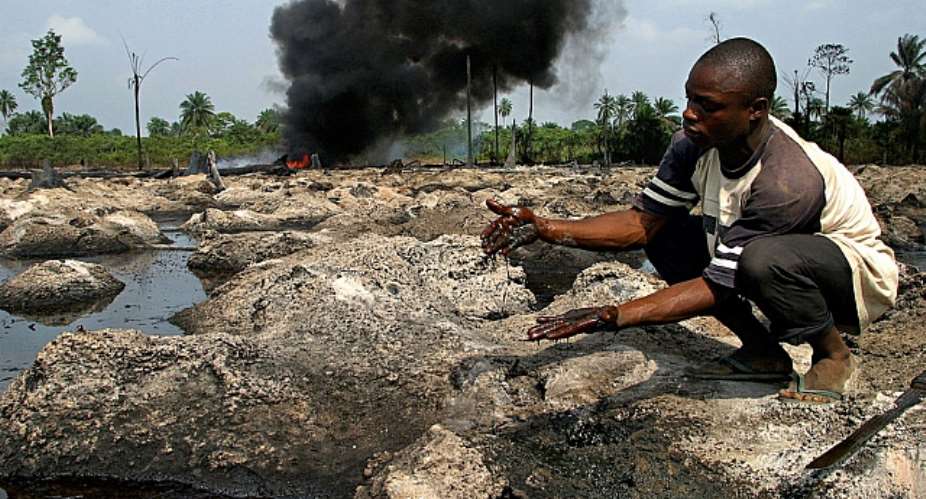RT is featuring a documentary about oil in Nigeria called Blood of Nigeria, directed by Philippe Lespinasse. It is well done and worth a look. RT is showing it in two parts. They will be consecutive on the schedule, but there may be other programs in between, and the RT schedule does not indicate which is part 1 and which is part 2. You can see the scheduled times here: Blood of Nigeria, and you can check the program schedule in Moscow time. If you don't get RT, you can watch it in their streaming video feed at the scheduled broadcast times.
The Niger Delta, one of the 10 most important wetland and coastal marine ecosystems in the world, has experienced an average of one oil spill per day, collectively the equivalent of one Exxon Valdez spill per year, for five decades, 50 years.
 Blood of Nigeria film crew travelling on the oil covered water in the Niger Delta. The oil covers the water and nothing lives beneath it.
Blood of Nigeria film crew travelling on the oil covered water in the Niger Delta. The oil covers the water and nothing lives beneath it.
You can watch the film online narrated in French at Le sang de Nigéria. The full film is about 53 minutes long. You will find more information and another link to the film here.
 Dead mangrove in the Niger Delta, suffocated by oil. These wetlands are part of the lungs of our planet.
Dead mangrove in the Niger Delta, suffocated by oil. These wetlands are part of the lungs of our planet.
 The approach to an informal oil refinery in the Niger Delta
The approach to an informal oil refinery in the Niger Delta
 An FPSO, Floating Production Storage and Offloading, an offshore oil & gas industry vessel, glittering in the sea off the coast of the Niger Delta
An FPSO, Floating Production Storage and Offloading, an offshore oil & gas industry vessel, glittering in the sea off the coast of the Niger Delta
After 50 years of massive oil spills the Niger Delta is a Laboratory For Oil Spills In Coastal Wetlands. Even so, no one is studying it, and attempts to study it are prevented.
For a quick and clear explanation of why Nigeria erupted in protests when the fuel subsidy was removed, see Naijablog.
Here is a brief excerpt:
“… the lived reality of citizens of the Nigerian state is that it provides little or no security, no infrastructure, no education and no employment opportunities (apart from mostly McJobs in the civil service). Everywhere in Nigeria, the basic elements of civilised existence have to be taken care of house-by-house, compound-by-compound. You must sink your own borehole for water, buy, install and fuel a generator for power, hire security guards to keep the wolves from the door, pay school fees to ensure your kids get a half-decent education because the public school system is in perpetual meltdown. And to earn enough money to get through the day, you must hustle.…
For the past few decades, cheap fuel has therefore been the only form of social contract between ordinary Nigerians and the state and the principle lever to control inflation during times of rising oil prices. With most Nigerians subsisting on US$2 or less, subsidised fuel has also been a survival mechanism, making life only just bearable.…
As it is, most Nigerians are poor, and will simply not be able to survive with any comfort on US$2 a day and a doubling of living costs.”
Crossed Crocodiles





 There’s nothing you can do for us; just give us electricity to save our collapsi...
There’s nothing you can do for us; just give us electricity to save our collapsi...
 Ghanaian media failing in watchdog duties — Sulemana Braimah
Ghanaian media failing in watchdog duties — Sulemana Braimah
 On any scale, Mahama can't match Bawumia — NPP Youth Organiser
On any scale, Mahama can't match Bawumia — NPP Youth Organiser
 Never tag me as an NPP pastor; I'm 'pained' the 'Akyem Mafia' are still in charg...
Never tag me as an NPP pastor; I'm 'pained' the 'Akyem Mafia' are still in charg...
 Your refusal to dedicate a project to Atta Mills means you never loved him — Kok...
Your refusal to dedicate a project to Atta Mills means you never loved him — Kok...
 2024 elections: I'm competent, not just a dreamer; vote for me — Alan
2024 elections: I'm competent, not just a dreamer; vote for me — Alan
 2024 elections: Forget NPP, NDC; I've the Holy Spirit backing me and nothing wil...
2024 elections: Forget NPP, NDC; I've the Holy Spirit backing me and nothing wil...
 2024 elections: We've no trust in judiciary; we'll ensure ballots are well secur...
2024 elections: We've no trust in judiciary; we'll ensure ballots are well secur...
 Performance tracker: Fire MCEs, DCEs who document Mahama's projects; they're not...
Performance tracker: Fire MCEs, DCEs who document Mahama's projects; they're not...
 Train crash: Railway ministry shares footage of incident
Train crash: Railway ministry shares footage of incident
